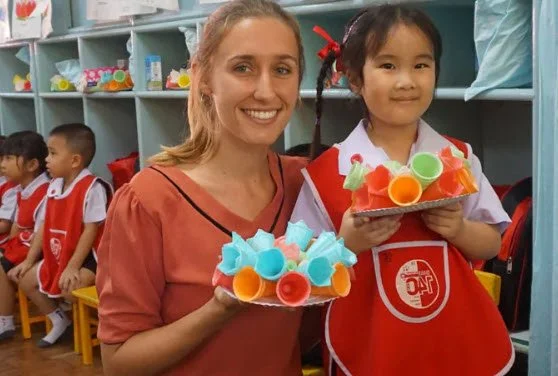
Volunteering and Internships
Volunteering abroad offers college students numerous benefits that contribute to their personal, academic, and professional growth.
These opportunities offer an inexpensive way to give back to communities, enrich your career path, and give you an unforgettable experience.

Why Volunteering and Internships Matter
-
Many organizations offer short term (1-3 weeks) as well as long term (months). This can give you an idea of what a career field is like while helping others. These experiences can fit into spring break, semester recess, or summer break. They are remarkably inexpensive.
-
Volunteering abroad exposes students to different cultures, languages, and ways of life. It helps them gain a deeper understanding of global issues such as poverty, education, and healthcare, fostering empathy and cultural sensitivity.
-
Living and working in a different country challenges students to step out of their comfort zones, adapt to new environments, and develop resilience. They often return with increased confidence, independence, and problem-solving skills.
-
Volunteering provides hands-on experience that can enhance career prospects. Students develop transferable skills like leadership, teamwork, and cross-cultural communication. For those interested in specific fields like education, healthcare, or environmental science, volunteering offers relevant, practical experience.
-
Unlike typical travel experiences, volunteering abroad allows students to make a direct, positive impact on communities. Whether teaching, building infrastructure, or working on conservation projects, their efforts can leave a lasting legacy
-
Volunteering abroad enables students to build connections with other volunteers, community members, and professionals. These relationships can lead to lifelong friendships, mentorship opportunities, and even career pathways.
-
For students traveling to non-English-speaking countries, volunteering provides immersion opportunities to practice language skills and learn cultural norms organically. This can be especially beneficial for students studying languages or international relations
-
Many employers and graduate programs value international experience and community engagement. Volunteering abroad demonstrates initiative, adaptability, and a commitment to social responsibility, setting students apart from their peers
“Volunteering abroad changed my life in ways I can’t fully describe. I came back more focused, more determined, and with a new understanding of what I want to do with my future. It made me realize that global citizenship is something we should all strive for.”
“Volunteering abroad has been the most eye-opening experience of my life. I never expected to learn as much about myself as I did about the world. I returned home with a broader perspective and a deep appreciation for different cultures.” ”
“The satisfaction of knowing that my work helped someone in need, even if it was just one person, is something I will carry with me forever. Volunteering abroad gave me the sense that I could actually contribute to solving global problems.”
-
When choosing a volunteer organization abroad, there are several important factors a college student should consider to ensure that their experience is rewarding, safe, and aligned with their personal goals. Here are the key considerations to keep in mind:
1. Program Alignment with Your Goals
Personal Interests and Skills: Consider what kind of work you’re passionate about or want to develop skills in. Whether it's teaching, healthcare, environmental conservation, or community development, choose a program that aligns with your interests or future career goals.
Professional Development: If you want to gain work experience related to your field of study, look for organizations that offer internships with a focus on skill-building and professional growth, such as those in healthcare, education, or business.
2. Reputation of the Organization
Research Reviews: Look for online reviews, testimonials, and experiences from past volunteers. Websites like GoAbroad, Volunteer Forever, and Trustpilot can give you insights into the reputation of the organization.
Accreditation and Transparency: Ensure that the organization is reputable and transparent about its operations. Some organizations are accredited by recognized standards or industry bodies, which can ensure a higher level of professionalism and ethics.
Word of Mouth: Talk to other students who have volunteered abroad or consult with your college’s study abroad office for recommendations. They may have insights into trusted programs.
3. Program Costs and Funding
Program Fees: Many volunteer organizations charge fees that cover things like accommodation, meals, insurance, and administrative costs. Be sure to understand what’s included in the cost and ensure it fits within your budget.
Additional Costs: Consider the cost of flights, visa fees, vaccinations, and personal expenses. Some programs offer scholarships or fundraising tips to help offset the cost.
Value for Money: Evaluate if the program offers good value in terms of the support provided, the impact of the work, and the overall experience.
4. Location and Cultural Considerations
Safety: Research the safety of the region or country where the program operates. Look up travel advisories, reviews from past volunteers, and consult government websites about safety in the area.
Cultural Fit: Consider whether the program allows you to immerse yourself in the local culture and how much interaction you will have with local communities. Some programs provide cultural orientation or language courses to help you adjust.
Language Requirements: Think about whether the program requires proficiency in a specific language. If you don’t speak the local language, look for programs that provide language support or where English is commonly spoken.
5. Level of Support Provided
Pre-departure Support: Check if the organization offers orientation sessions, help with visa applications, or pre-trip resources to help you prepare.
In-Country Support: Make sure there’s adequate in-country support, such as local staff, guides, or coordinators, who can assist you with any issues that arise during your stay. This is especially important if you’re traveling alone or to a country where you’re unfamiliar with the culture or language.
Safety and Emergency Protocols: Ensure the organization has clear protocols in case of emergencies (e.g., medical emergencies, natural disasters, political instability) and offers 24/7 support.
6. Impact of the Program
Sustainability: Consider whether the organization has a focus on sustainability and whether the programs they run are truly beneficial to the local community. Look for organizations that emphasize collaboration with local people rather than charity or "voluntourism."
Measurable Outcomes: Check whether the organization tracks and reports on the impact of its programs. Some reputable organizations provide detailed reports or even allow you to see how your efforts contribute to long-term goals.
7. Time Commitment and Flexibility
Duration: Ensure the duration of the program fits within your academic schedule. Some organizations offer short-term volunteer opportunities during breaks, while others might require a longer commitment.
Flexibility: If you have a tight schedule or need flexibility (e.g., in the start date or duration), check whether the program allows you to tailor your participation to suit your availability.
8. Accommodation and Living Conditions
Living Arrangements: Understand where you will be staying during your volunteer work. Will you be in a homestay, volunteer house, or shared accommodation? It’s important to know if the living conditions are comfortable and safe.
Meals and Other Amenities: Check if meals are provided and whether there are any additional costs for food or amenities. If you have dietary restrictions, confirm whether they can accommodate your needs.
9. Visa and Legal Requirements
Visa Support: Some countries require specific visas for volunteering. Verify whether the organization provides visa support or if you'll need to arrange it independently.
Work Authorization: In some countries, you may need a specific work or volunteer permit. Ensure that the organization is knowledgeable about visa and work permit requirements and can guide you through the process.
10. Post-Program Support and Networking
Certificate or Recommendation: Some volunteer programs offer certificates or letters of recommendation after completion. These can be valuable additions to your resume or portfolio, especially if you’re looking to enter the nonprofit or international development field.
Alumni Networks: Check if the organization has an alumni network or ongoing opportunities for you to stay engaged with other volunteers or the organization itself.
11. Environmental and Social Responsibility
Eco-friendly Practices: Consider whether the organization prioritizes sustainability and eco-friendly practices in their operations. This might include waste management, energy conservation, and support for eco-conscious projects.
Social Impact: Evaluate whether the organization works to support the rights and welfare of the local community, including providing equitable opportunities and ensuring the benefits are mutual for both volunteers and locals.oes here
When choosing an organization, it's important to read up on the specific programs and their terms, as well as to look at reviews on trusted platforms.
Take some time and “interview” the organizations on the phone, ask for references of students who have completed a program, spend time reviewing their website. Above is a comprehensive list (expand +) of things to think about and ask.
Popular Volunteer and Internship Organizations






